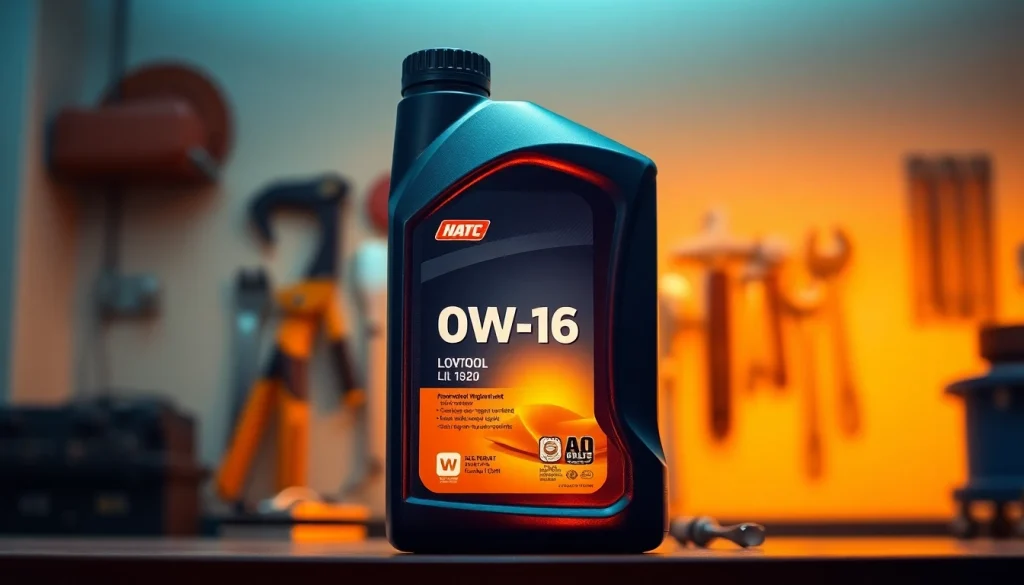The Benefits and Uses of 0W-16 Oil for Modern Engines

Understanding 0W-16 Oil
What is 0W-16 Oil?
0W-16 oil is a type of synthetic motor oil that belongs to the SAE (Society of Automotive Engineers) classification. The “0” in 0W-16 indicates its low-temperature viscosity, meaning it flows easily at cold temperatures, which is essential for engine start-up in frigid conditions. The “16” represents the oil’s viscosity at 100 degrees Celsius. This dual-number system allows vehicle manufacturers to specify the ideal oil grade for their engines based on the operating temperature conditions they are designed for.
Engine oils are crucial for minimizing friction and wear in engine components, and using the correct viscosity contributes to overall performance and longevity. For many modern vehicles, especially fuel-efficient and hybrid models, 0W-16 oil is highly recommended.
The Composition of 0W-16 Oil
0W-16 oil is primarily composed of synthetic base stocks and a blend of additives. Synthetic oils are engineered to provide superior performance compared to conventional mineral oils. Some of the common components include:
- Base Oils: Synthetic base oils offer stronger properties than traditional mineral oils, resulting in better performance across a range of temperatures.
- Additives: These boost the oil’s performance, including detergents (to clean engine parts), dispersants (to keep contaminants suspended), and anti-wear agents (to reduce friction).
- Viscosity Modifiers: These improve the performance of the oil at both high and low temperatures, ensuring that the oil maintains its protective properties.
This unique composition allows 0W-16 oil not only to flow swiftly at lower temperatures but also to maintain robust protection under higher operating temperatures, enhancing fuel efficiency.
How 0W-16 Oil Differs from Other Oil Viscosities
The key difference between 0W-16 oil and other viscosity grades, such as 0W-20 or 5W-30, lies in its viscosity properties. The thinner 0W-16 oil can provide smoother operation in engines designed for it, enabling better fuel economy, especially in modern vehicle applications. Comparatively:
- 0W-20: Slightly thicker at elevated temperatures, which may benefit high-performance engines but can result in reduced mileage due to increased drag.
- 5W-30: Commonly used in older vehicles; while it may offer better protection in high-temperature conditions, it can negatively affect fuel economy in engines designed for lighter oils like 0W-16.
In essence, using the recommended viscosity ensures that manufacturers’ engineering intentions for fuel efficiency and performance are met, making 0W-16 oil preferable for certain modern engines.
Advantages of Using 0W-16 Oil
Improved Fuel Economy with 0W-16 Oil
One of the most significant benefits of using 0W-16 oil is the substantial improvement in fuel economy it can provide. Because it is a lighter oil, it creates less resistance as it flows through the engine, allowing for less energy consumption:
- Fluid Dynamics: The lower viscosity allows the oil to move more freely within the engine, meaning less energy is required to pump it, leading to better fuel consumption.
- Engine Efficiency: Vehicles designed for 0W-16 have their tolerances set up for the precise flow characteristics of this oil, leading to optimized combustion and reduced fuel waste.
- Real-World Impact: Studies have shown that vehicles using 0W-16 oil can achieve an increase in miles per gallon (MPG) by as much as 2-6%, depending on driving conditions and vehicle design.
Engine Protection and Performance
In addition to its fuel-efficient properties, 0W-16 oil offers impressive protection and performance characteristics:
- Wear Reduction: The advanced formulations in synthetic oils provide greater film strength and stability, minimizing wear and tear on engine components.
- Temperature Stability: 0W-16 oils maintain viscosity across a broad temperature range, which is crucial for both start-up conditions and prolonged highway driving.
- Cleaning Capability: The detergents in 0W-16 oils actively clean the engine, preventing sludge build-up and ensuring smoother operation over time.
Ultimately, the use of 0W-16 oil contributes to a longer engine life and enhances performance, making it suitable for high-mileage vehicles.
Environmental Benefits of 0W-16 Oil
With increasing focus on sustainability and reducing carbon footprints, choosing the right engine oil can make a significant difference:
- Reduced Emissions: More efficient engines using 0W-16 oil produce fewer CO2 emissions, contributing to improved air quality.
- Lower Oil Dependency: Enhanced fuel economy means that less oil is needed over the vehicle’s lifespan. This reduced consumption directly correlates with less crude oil extraction and reduced environmental impact.
- Designed for Modern Engines: As manufacturers evolve towards lighter engine designs and more fuel-efficient technologies, 0W-16 is tailored to meet the requirements of eco-friendly vehicles.
When to Use 0W-16 Oil
Recommended Vehicles for 0W-16 Oil
Not all vehicles can benefit from 0W-16 oil, but those designed specifically for it include newer models from manufacturers such as Toyota, Subaru, and Honda. Common vehicles that typically require 0W-16 include:
- Toyota Prius
- Toyota Camry (2020 and newer)
- Subaru Crosstrek (2018 and newer)
- Honda Accord Hybrid
- Hyundai Sonata Hybrid
Always refer to the owner’s manual or consult with a professional mechanic to verify the correct oil requirement for your vehicle.
Driving Conditions Ideal for 0W-16 Oil
0W-16 oil is particularly well-suited for certain driving conditions:
- Urban Driving: With stop-and-go traffic, lightweight oils like 0W-16 are ideal as they reduce resistance and improve fuel economy.
- Cold Climates: The “0W” rating is beneficial in cold weather, allowing easy start-up and quicker oil circulation.
- Highway Travel: Extended highway driving can benefit from the oil’s ability to maintain engine temperature and efficiency.
Oil Change Intervals with 0W-16 Oil
A significant advantage of modern synthetic oils, including 0W-16, is the oil change interval. Most manufacturers specify intervals of 7,500 to 10,000 miles, although some drivetrains may allow extended intervals:
- Standard Changes: For typical driving conditions, changing the oil approximately every 7,500 miles is advisable, while severe driving conditions (frequent short trips, towing, etc.) may require changes sooner.
- Monitoring Oil Levels: It’s recommended to periodically check oil levels between changes, as even synthetic oils can consume small amounts over time.
Choosing the Right Brand of 0W-16 Oil
Popular Brands of 0W-16 Oil
Several reputable brands manufacture 0W-16 synthetic motor oil. Some of the most popular include:
- Mobil 1: Renowned for high-quality synthetic oils, including their Mobil 1™ Advanced Fuel Economy 0W-16.
- Valvoline: Offers the Valvoline Advanced Full Synthetic Motor Oil that boasts superior protection against engine contaminants.
- Royal Purple: Known for high-performance formulations, including a 0W-16 option that enhances engine protection.
- Castrol: Their EDGE series includes advanced synthetic options that also feature 0W-16 viscosity.
Factors to Consider When Choosing 0W-16 Oil
When selecting a 0W-16 oil for your vehicle, consider the following:
- Manufacturer Specifications: Always consult your vehicle’s owner manual for the recommended oil. This will ensure optimum compatibility and performance.
- API Certification: Look for oils that meet or exceed classifications set by the American Petroleum Institute (API), ensuring quality and performance.
- Brand Reputation: Established brands with a proven track record in engine protection and performance are generally more reliable.
Brand Comparisons: 0W-16 Oil Options
Choosing the right oil also depends upon specific vehicles and conditions. Here’s a quick comparison for better understanding:
| Brand | Key Features | Price Range (5 Quarts) |
|---|---|---|
| Mobil 1 | Excellent fuel economy & thermal stability | $30 – $35 |
| Valvoline | Advanced protection against engine wear | $28 – $32 |
| Royal Purple | High performance & wear protection | $35 – $40 |
| Castrol | Excellent oil breakdown strength | $30 – $36 |
Common Questions About 0W-16 Oil
What Engines Need 0W-16 Oil?
Engines designed with lower viscosity requirements, typically found in modern hybrid and fuel-efficient vehicles, most commonly require 0W-16 oil. Notably, such engines are generally optimized for lighter oils, providing better fuel economy while maintaining effective lubrication. Always refer to your specific vehicle’s requirements to confirm the right oil grade.
Can You Substitute 0W-16 Oil for Other Grades?
While substituting 0W-16 for 0W-20 or other higher viscosity oils is technically possible, it’s not recommended. Doing so may lead to insufficient lubrication in engines designed for thicker oils, risking damage and decreased efficiency. Always use the oil grade specified in your vehicle’s manual for optimal performance.
How to Properly Store 0W-16 Oil
Proper storage of motor oil is critical to maintaining its quality. Here are some tips:
- Keep it Sealed: Ensure the oil containers are tightly sealed to prevent contamination.
- Store in a Cool, Dry Place: Avoid extreme temperatures and direct sunlight, which can degrade the oil’s quality.
- Observe Expiration Dates: Check for recommended expiration or use-by dates on the container and utilize oils before they reach these dates for best results.







